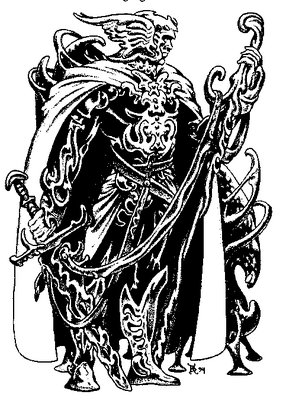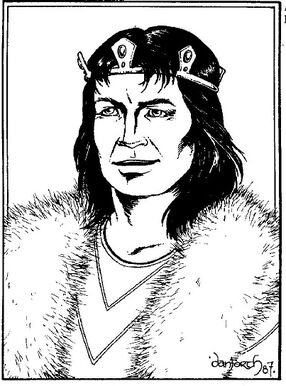
Númenórean
The Númenóreans (Ad.,"Adûnai", "Westmen") were the men of Númenor, those descendants of the three houses of the Edain who had settled the Island Realm of Númenor in the Second Age. Those Númenóreans of the Elendili who settled the coasts of the Westlands and founded the kingdoms of Arnor and Gondor were also known as the Dúnedain and they continued to speak Sindarin as their formal speech of etiquette, although they used Adûnaic as their lingua franca, and later its descendant Westron. The King's Men or Aruwanai who settled the coastlands south of Umbar were called Black Númenóreans by their northern brethren.
Appearance[]

Ar-Pharazôn, Númenórean King
The Adûnai regarded the pale skin of the Eldar as prestigious, however, many among the hard-working rural population and the sun-tanned mariners had ruddy or darker skin (indeed many of the original Beorians and Halethrim were of dark complexion, as was the later mixed population from Hithlum of both Adanic and Bórian or Uldorian descent – which the Númenórians mentioned little!), so pale skin became the ideal of the upper classes. In later times it was seen as a symbol of pure-blooded Númenórean descent, as the former free working classes rose to the status of urban citizens and rural Gentry when the lower classes were replaced by unfree slaves imported from all over Middle-earth and a mixed-blooded class of unfree and semi-unfree Peregrini evolved. The original Adûnai were a tall folk, 6'4 not being uncommon among them, although their later descendants used to be smaller in stature. Most common Adûnai were black-haired or brown-haired, being largely descendants of the Beorians and Halethrim, but in the royal line, there also were some flaxen or golden-haired families, offspring of the house of Hador. Adûnai were usually grey-eyed, though brown or blue eyes were not uncommon.
Religion[]
The Adûnai revered the One God Êru and his subject-spirits the Avalôi or Êru-bêni, especially Gimilnitîr or Avradî and Amân or Adûnakhôr, but also Abâr, Agân, Azâr and Magân. Later under Zigurûn's tutelage they largely abolished the reverence of Êru and made the cult of Alkar or Mulkhêr their imperial religion, while the few remaining Faithful or Elendili mostly left Númenor for the colonies of the northwest.
Culture[]
The Adûnai were the greatest seamen and scholars among the mortals and certainly also the most skilled artificers and warriors. However, with the drowning of Númenor, much of the Adûnai's knowledge was lost forever and their Dúnadan and Aruwanai descendants only inherited a shadow of their forefathers' former glory.
Lifespan[]
While the early half-elven royal line of the Númenórean Kings lived up to 400 years and even the lesser Númenóreans often lived up to 200 years, their Elendili and Aruwanai descendants of the late third age only came to live for no longer than 100 years, 150 years being a sign of royal descent, with the notable exception of Elessar I who died at the age of 210.
See also[]
- Adúnali
- Amazôn-Women
- Atalantedain
- the Cult of identity
- Drúedain
- Eneadurians
- Taranians
- Udahir (People)
- Zyedrahir
Númenóreans of Renown[]
Abârzagar Abrâzâni Adûnahil Adûnaphel Adûnazagar Adûnazil Adûrazil Ailinel of Númenór Akhôrahil Akhôraphil Alcariel Almarian Almáriel Almiel of Númenór Amandil of Andúnië Anárion Elendilion Ar-Abattârik Ar-Adûnakhôr Ar-Aphanuzîr Ar-Balkumagân Ar-Belzagar Ar-Gimilzôr Ar-Indilzar Ar-Inziladûn Ar-Nimruzîr Ar-Pharazôn Ar-Sakalthôr Ar-Zimraphel Ar-Zimrathôn Aratan Ardamir of Númenór Ardûmir Arimûr Atanalcar Aulendil of Andúnië Axantur Baian of Syntar Barach of Lond Daer Bedaian of Númenór Belzagar of Formenos Beregar of Andustar Caliondo Cemendur Ardamirion Cemendur Axanturion Ciryamir Ciryatir Ciryatur Ciryon son of Isildur Corianna Cyrondur Dâur abâr Durlund Eärendur of Andúnie Eärendur Amandilion Eärmacil Edhelion of Eldalonde Elatan Eldarion Elendil the Tall Elendur son of Isildur Elentir Elros Tar-Minyatur Erendis Uineniel Er-Mûrazôr Ercamir Ermithdin of Alarkadar Er-Endohir Er-Imrazôr Fíriel of Andunie Fuinur son of Edhelion Gilthalion Gimilkhâd Gimilzagar Gorlim of Númenór Hallacar Hallatan of Hyarastorni Hatholdir Henderch of Andustar Herucalmo Herumor son of Edhelion Hûmazîr Îbal son of Ulbar Imrazôr the Faithful Inzilbêth Írildë Isildur Elendilion Isilmë Isilmo Itarildë Lindárië Lindissë Lindórië Mairen Malantur the Númenórean Manwendil Maran the Silent Melian of Lond Daer Meneldil Nessanië Nólimon Nolondil Númendil Númendur Núneth of Andustar Ohtar of Arnor Orchaldor Oromendil Orondil the Explorer Orontor Pharconatar Rádil Razanur the Traveller Sakalzîr Silmariën of Andúnië Soronto Tar-Alcarin Tar-Aldarion Tar-Amandil Tar-Anárion Tar-Ancalimë Tar-Ancalimon Tar-Atanamir Tar-Ciryatan Tar-Elendil Tar-Meneldur Tar-Minastir Tar-Míriel Tar-Palantir Tar-Súrion Tar-Telemmaitë Tar-Telperiën Tar-Vanimeldë Tar-Vardamir Taramin Thamachor Ankatare Tindómiel Ulbar of Emerie Ûrîzagar Valandil of Andúnie Vardamil Vardamir Nólimon Vardilmë Veantur of Rómenna Yávien Zadanzagar Zamîn Zimraphel
